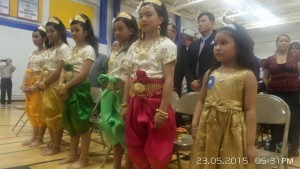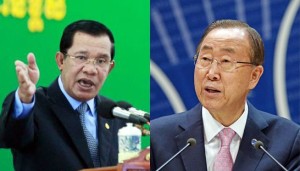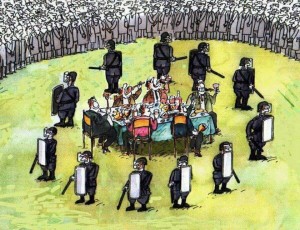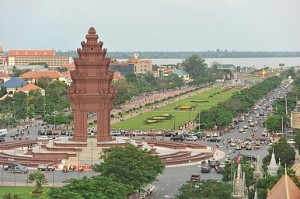Political Paradigm of Pragmatism
now browsing by tag
The effectiveness of leadership is to produce more leaders not more followers
Political Paradigm of Pragmatism from the Khmer Youth part 51
This part (51), Mr. Sophan Seng elaborated on good leaders who have always produced more leaders, not more  followers. Theoretically, the concept broadens from family leadership, to community and nation leadership. Western philosophy as well as Cambodian philosophy exclusively boosts the importance of empowering youths and new members of community to be self-reliance and self-accountability. Khmer proverb says “young bamboo shoots are the backbone of future generations” is a testament of this basic human resource leadership.
followers. Theoretically, the concept broadens from family leadership, to community and nation leadership. Western philosophy as well as Cambodian philosophy exclusively boosts the importance of empowering youths and new members of community to be self-reliance and self-accountability. Khmer proverb says “young bamboo shoots are the backbone of future generations” is a testament of this basic human resource leadership.
Practically, at the juncture of Cambodia changes, political landscape has been inherited by hierarchy of upper power abused their own power boundary to advance for personal gains. Subsequently, the lower powers and bottom line citizens are tamed to be submissive and dependent. This type of leadership shall shrink this nation in the long term future.
To develop this nation for long term future sustainable growth, the attitude change is a must for all Cambodian citizens. But to achieve this mission pragmatically, we should consider the Khmer proverb “don’t bent the Srolao tree, don’t instruct the oldies”. So to change attitude of Cambodian people, we should begin with those children (kindergarten or grade 1).
Paternal Government and Oligarchy Leadership of Cambodia
Political Paradigm of Pragmatism from the Khmer Youth part 50
This part (50), Mr. Sophan Seng analysed on an unavoidable internal conflicts within the weak laws enforcement  states. Political scientists found that major democratic states were evolved from internal conflicts and competitions especially among “personal interest group”. It is rare to having change to democracy through external force.
states. Political scientists found that major democratic states were evolved from internal conflicts and competitions especially among “personal interest group”. It is rare to having change to democracy through external force.
But, this evolution has experienced fragile and risky than sustainable success because of deadly conflicts among personal interest group and internal rivals were not deterred including the dividing force is too strong to resist.
PM Hun Sen has believed in himself about controlling people with all means he could use to maintain such leadership. His leadership style is more inclined into private CEO rather than to fulfill his duties in accordance to democratic principles or the rule of laws. Realistically, Cambodia has been a paternal government (leaders are regarded as father of the people) and oligarchy leadership (only strong and powerful networks operate the state affairs) through UNTAC organized democratic election in 1993. When PM Hun Sen were able to control power, he has remained using the same leadership “paternal government and oligarchy networks by mixing with crony free market capitalism”.
Many times, PM Hun Sen has explicitly and implicitly intervened the due processes of the Cambodia court. The effort to control the court shall intensify the internal conflicts as well as the bloody conflict which is hardly to be avoided.
January 7 is analysed as dividing day for Cambodia political leadership
Political Paradigm of Pragmatism from the Khmer Youth part 49
This part (49), Mr. Sophan Seng analysed the celebration of “January 7, 1979” in which Cambodia’s People Party (CPP) under PM Hun Sen’s leadership has always celebrated this day as liberation day. At all times, the party’s policy has condemned Khmer Rouge regime by valuing the invading day of Vietnam.
According to his view, many analysts have viewed this day as a “dividing day” for Cambodia politics. To prove its dividing synthesis, two factors are articulated:
-
From the period of Angkor’s decline, Cambodia political leadership has been so divisive among Khmer leaders. Each side has always asked for aids from Siam and Dai Viet to support their causes to advance for personal powers and interests. Thus, the compensation was huge. Sometime, each side compensated national treasure, some time each side compensate land. As a witness, Cambodia land has been in a significant shrink.
-
External political changes especially the aura of the cold war that each powerful countries took small countries as their hostage for negotiation. Cambodia was one of those states being brutalized.
The tactic of creating events to control events of Cambodia political leadership part 48
 This part (48), Mr. Sophan Seng analysed the old political tactic of “creating events aiming to control events”. This tactics have been used a lot among those states with weak laws enforcement. When court is not reliable, the powerful can utilize all means to strengthen and prolong their power.
This part (48), Mr. Sophan Seng analysed the old political tactic of “creating events aiming to control events”. This tactics have been used a lot among those states with weak laws enforcement. When court is not reliable, the powerful can utilize all means to strengthen and prolong their power.
The strategy of “divide and conquer” has been also well-known among those week law enforcement state.












